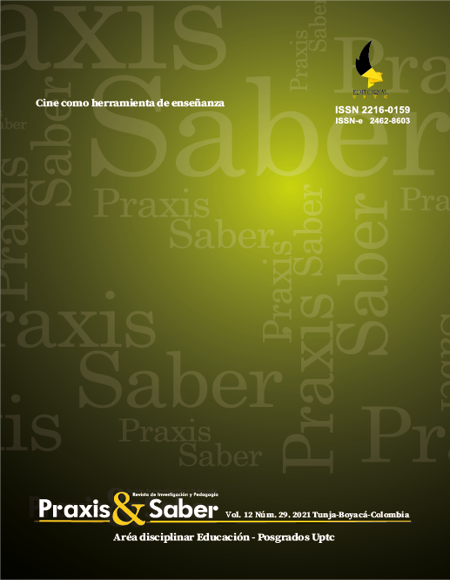Cinema, subjectivation, and education. An “essay” by several voices

Abstract
This text essays a few looks, words and connections between cinema, philosophy, childhood and education. For that, a dialogue between close perspectives and distinct scenarios is proposed: one from Brazil, by means of productions of images by boys and girls, and another from Colombia, which questions assumed forms in the relation between teaching and learning Philosophy. The path of this conversation in the arrangement of a text aims to explore relations, detachments and circles around these three axes of analysis. The first, after a brief synopsis as preamble, is developed around childhood as the first scene of this exercise. The relation between Cine and Education takes place in the second scene and, at last, as an ending, a third scene whose objective will be to explore the possibilities and investigative worries that rise in the relation between Cinema, Philosophy and Education. The set of interpellations and convergencies allow to imply some matters of research, philosophy and teaching, along with works of production of images by boys and girls
Keywords
infancia, cine, enseñanza de la filosofía, aprender
Author Biography
Cesar Donizetti Pereira Leite
Cesar Leite. Psicólogo de la PUC-Campinas, Magister y Doctor en Educación de la UNICAMP, Livre-Docente de la UNESP. Profesor Asociado III del Departamento de Educación de UNESP-Brasil. Investigador PQ2 del CNPQ. Líder del Grupo de Investigación IMAGO - Laboratorio da Imagen, experiencia e criação. E-mail mvhleite@uol.com.br.
Oscar Espinel
Doctor de la Facultad de Filosofía y Letras de la Universidad de Buenos Aires. Magister en educación y Especialista en Pedagogía de la Universidad Pedagógica Nacional y filósofo de la Universidad Nacional de Colombia. Profesor del Departamento de Filosofía de la Corporación Universitaria Minuto de Dios - UNIMINUTO. Miembro del Grupo de Investigación Pensamiento, Filosofía y Sociedad. E-mail: oscar.espinel@yahoo.com.
References
Agamben, G. (1989). Idea de la prosa. Península.
Agamben, G. (2010). Ninfas. Pre-textos
Barros, M. (2013). Arranjos para assobio. Editora Leya.
Cabrera, J. (2015). Cine: 100 años de filosofía. Gedisa.
Deleuze, G. (1987). La imagen-tiempo. Estudios sobre Cine 2. Paidós.
Espinel, Ó. (2016). Sobre la idea de una educación filosófica. En Ó. Espinel (Ed.), Pensar a la intemperie. Ensayos filosóficos (pp. 15-34). Uniminuto.
Espinel, Ó, & Pulido, Ó. (2016). Educación filosófica e inquietud de sí. Diálogos entre Estanislao Zuleta y Pierre Hadot. En W. Kohan, S. Lopes, & F. Martins (Comps.), O ato de educar em uma lingua ainda por ser escrita (pp. 439-450). Editorial Nefi.
Espinel, Ó., & Pulido, Ó. (2017). Perspectivas metodológicas en el “último” Foucault. Nuevos horizontes, nuevos problemas. En Ó. Pulido, & Ó. Espinel (Comps.), Formas y expresiones metodológicas en el último Foucault (pp. 135-157). Editorial UPTC.
Garcés, M. (2015). Filosofía inacabada. Galaxia Gutemberg.
Godard, J. (Director). (1968). Un film comme les autres [Pelicula].Anouchka Films.
Guattari, F. (1992). Revolução Molecular: pulsações políticas do desejo. Editora Brasiliense.
Kohan, W. (2007). Sobre las antinomias de enseñar filosofía. Cuestiones De Filosofía, (9). https://doi.org/10.19053/01235095.631
Kohan, W. (2011). Desafíos para pensar… la enseñanza de la filosofía. Cuestiones De Filosofía, (11). https://doi.org/10.19053/01235095.v0.n11.2009.649
Leite, C. (2012). Infância, Experiência e Tempo. Cultura Acadêmica.
Miranda, J. (2010). A influência do grupo Dziga Vertov no cinema de Jean-Luc Godard [Dissertação de Mestrado, UNICAMP]. http://repositorio.unicamp.br/jspui/handle/REPOSIP/284944
Zuleta, E. (1995). Educación y democracia. Hombre Nuevo Editores.
